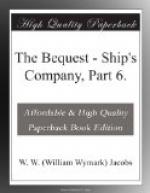“Just what my missis did say to her,” said the other; “but she didn’t pay much attention. She said it was Henry’s wish and she didn’t care what happened to her now he’s gone. Besides, if you come to think of it, what else is she to do? Don’t you worry, Bob; you won’t lose her again.”
Mr. Clarkson, staring at the fire, mused darkly. For thirty years he had played the congenial part of the disappointed admirer but faithful friend. He had intended to play it for at least fifty or sixty. He wished that he had had the strength of mind to refuse the bequest when the late Mr. Phipps first mentioned it, or taken a firmer line over the congratulations of his friends. As it was, Little Molton quite understood that after thirty years’ waiting the faithful heart was to be rewarded at last. Public opinion seemed to be that the late Mr. Phipps had behaved with extraordinary generosity.
“It’s rather late in life for me to begin,” said Mr. Clarkson at last.
“Better late than never,” said the cheerful Mr. Smithson.
“And something seems to tell me that I ain’t long for this world,” continued Mr. Clarkson, eyeing him with some disfavour.
“Stuff and nonsense,” said Mr. Smithson. “You’ll lose all them ideas as soon as you’re married. You’ll have somebody to look after you and help you spend your money.”
Mr. Clarkson emitted a dismal groan, and clapping his hand over his mouth strove to make it pass muster as a yawn. It was evident that the malicious Mr. Smithson was deriving considerable pleasure from his discomfiture—the pleasure natural to the father of seven over the troubles of a comfortable bachelor. Mr. Clarkson, anxious to share his troubles with somebody, came to a sudden and malicious determination to share them with Mr. Smithson.
“I don’t want anybody to help me spend my money,” he said, slowly. “First and last I’ve saved a tidy bit. I’ve got this house, those three cottages in Turner’s Lane, and pretty near six hundred pounds in the bank.”
Mr. Smithson’s eyes glistened.
“I had thought—it had occurred to me,” said Mr. Clarkson, trying to keep as near the truth as possible, “to leave my property to a friend o’ mine —a hard-working man with a large family. However, it’s no use talking about that now. It’s too late.”
“Who—who was it?” inquired his friend, trying to keep his voice steady.
Mr. Clarkson shook his head. “It’s no good talking about that now, George,” he said, eyeing him with sly enjoyment. “I shall have to leave everything to my wife now. After all, perhaps it does more harm than good to leave money to people.”
“Rubbish!” said Mr. Smithson, sharply. “Who was it?”
“You, George,” said Mr. Clarkson, softly.
“Me?” said the other, with a gasp. “Me?” He jumped up from his chair, and, seizing the other’s hand, shook it fervently.
“I oughtn’t to have told you, George,” said Mr. Clarkson, with great satisfaction. “It’ll only make you miserable. It’s just one o’ the might ha’ beens.”




